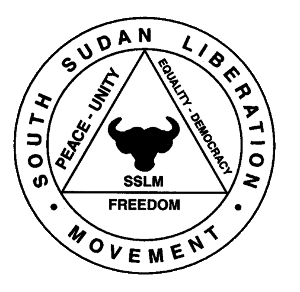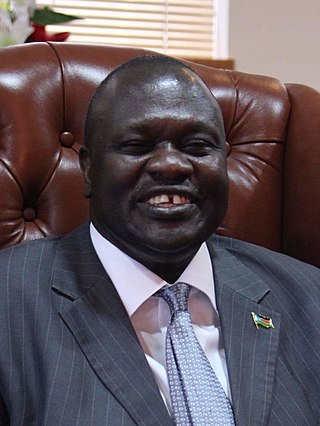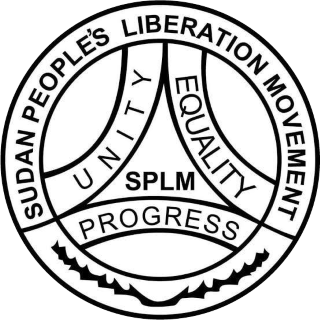Related Research Articles

The South Sudan Liberation Movement (SSLM) is an armed group that operates in the Upper Nile Region of South Sudan. The group's creation was announced in November 1999 by people of the Nuer ethnicity who were in both the rebel Sudan People's Liberation Army (SPLA) and the government-allied South Sudan Defence Forces (SSDF) gathered in Waat. The SSLM was declared to be unaligned in the Second Sudanese Civil War, then entering its sixteenth year. The name "South Sudan Liberation Movement" was decided upon the next year, borrowing from the earlier Southern Sudan Liberation Movement, which existed in the 1980s.

Salva Kiir Mayardit, also known as Salva Kiir, is a South Sudanese politician who has been the President of South Sudan since its independence on 9 July 2011. Prior to independence, he was the President of the Government of Southern Sudan, as well as First Vice President of Sudan, from 2005 to 2011. He was named Commander-in-Chief of the Sudan People's Liberation Army (SPLA) in 2005, following the death of John Garang.

Riek Machar Teny Dhurgon is a South Sudanese politician who served as the First Vice President of South Sudan.

The Sudan People's Liberation Movement is a political party in South Sudan. It was initially founded as the political wing of the Sudan People's Liberation Army in 1983. On January 9, 2005 the SPLA, the SPLM and the Government of Sudan signed the Comprehensive Peace Agreement, ending the civil war. SPLM then obtained representation in the Government of Sudan, and was the main constituent of the Government of the then semi-autonomous Southern Sudan. When South Sudan became a sovereign state on 9 July 2011, SPLM became the ruling party of the new republic. SPLM branches in Sudan separated themselves from SPLM, forming the Sudan People's Liberation Movement–North. Further factionalism appeared as a result of the 2013–2014 South Sudanese Civil War, with President Salva Kiir leading the SPLM-Juba and former Vice President Riek Machar leading the Sudan People's Liberation Movement-in-Opposition.

The politics of South Sudan concern the system of government in the Republic of South Sudan, a country in East Africa, and the people, organizations, and events involved in it.

The South Sudan People's Defence Forces (SSPDF), formerly the Sudan People's Liberation Army (SPLA), is the army of the Republic of South Sudan. The SPLA was founded as a guerrilla movement against the government of Sudan in 1983 and was a key participant of the Second Sudanese Civil War, led by John Garang. After Garang's death in 2005, Salva Kiir was named the SPLA's new Commander-in-Chief. As of 2010, the SPLA was divided into divisions of 10,000–14,000 soldiers.
Peter Gatdet Yak or Peter Gadet was a Sudan People's Liberation Army (SPLA) general who became the leader of the South Sudan Liberation Army (SSLA), a rebel movement in South Sudan.
Ethnic violence in South Sudan has a long history among South Sudan's varied ethnic groups. South Sudan has 64 tribes with the largest being the Dinka, who constitute about 35% of the population and predominate in government. The second largest are the Nuers. Conflict is often aggravated among nomadic groups over the issue of cattle and grazing land and is part of the wider Sudanese nomadic conflicts.

James Wani Igga is a South Sudanese who was the second vice president of South Sudan. He was speaker of the National Legislative Assembly from 2011 to 2013 and secretary general of the Sudan People's Liberation Movement.
Telar Ring Deng was a South Sudanese politician and statesman.

The South Sudanese Civil War was a multi-sided civil war in South Sudan between forces of the government and opposition forces. In December 2013, President Salva Kiir accused his former deputy Riek Machar and 10 others of attempting a coup d'état. Machar denied trying to start a coup and fled to lead the Sudan People's Liberation Movement-in-Opposition (SPLM-IO). Fighting broke out between the Sudan People's Liberation Movement (SPLM) and SPLM-IO, igniting the civil war. Ugandan troops were deployed to fight alongside the South Sudanese government. The United Nations has peacekeepers in the country as part of the United Nations Mission in South Sudan (UNMISS).

The Sudan People's Liberation Movement-in-Opposition, also known as the anti-governmental forces (AGF), is a mainly South Sudanese political party and rebel group that split from the Sudan People's Liberation Movement in 2013, due to political tensions between President Salva Kiir and Vice President Riek Machar over leadership of the SPLM. Tensions grew between forces loyal to Kiir and Machar and South Sudan plunged into the South Sudanese Civil War.

Armed clashes took in Wau State from late June 2016 to January 2019 between the Dinka-dominated Sudan People's Liberation Army (SPLA) and local opposition forces, consisting of tribal Fertit militias as well as fighters claiming allegiance to Riek Machar. It is unclear to what extent these rebels were actually part of the SPLM-IO or acting independently while using the SPLM-IO's name. The clashes resulted in the arrest of the state's governor, Elias Waya Nyipuoc, widespread death and destruction in the state capital, Wau town, and the displacement of up to 150,000 people.
Mathiang Anyoor, also spelled Mathiang Anyur, also known as Dot Ke Beny, is a Dinka-affiliated militia group in South Sudan. Originally an ad-hoc volunteer force founded in 2012, the militia was transformed into a private army to protect President Salva Kiir Mayardit and army chief Paul Malong Awan. However, the South Sudanese military (SPLA) claims that it is just another battalion. Much of the ethnic violence against non-Dinkas in the South Sudanese Civil War is attributed to the militia.
The South Sudan United Front/Army (SS-UF/A), often just called South Sudan United Front (SS-UF), is a South Sudanese rebel group which has taken part in the South Sudanese Civil War.
The 2014 retreat from Western Bahr el Ghazal, also called the long march north, was an unorganized withdrawal by hundreds of Nuer Sudan People's Liberation Army (SPLA) deserters who sought to flee from Bahr el Ghazal to Sudan during the South Sudanese Civil War. After longstanding tensions between SPLA soldiers belonging to the Dinka and Nuer ethnic groups escalated on 25 April 2014, leading to a massacre of Nuer soldiers at Mapel in Western Bahr el Ghazal, a large number of Nuer SPLA soldiers deserted to escape ethnic prosecution and loyalist SPLA forces. Though some deserters joined SPLM-IO rebels or surrendered to the government, a large number of them marched northward, joined by other SPLA defectors from Northern Bahr el Ghazal. After covering over 400 kilometres (250 mi), this trek eventually arrived in Sudan on 4 August 2014, where they were disarmed.
This article lists events from the year 2019 in South Sudan

The Kitgwang Declaration was a coup by South Sudanese rebel commander Simon Gatwech Dual on 4 August 2021, in which he replaced Vice President Riek Machar as leader of the Sudan People's Liberation Movement/Army in Opposition leading to a deadly conflict.
On 4 January 2018, SPLM-IO rebels loyal to Chan Garang Lual attacked the western parts of Juba, the capital of South Sudan. The raid was part of the South Sudanese Civil War. Once in Juba, the insurgents were reportedly joined by Sudan People's Liberation Army (SPLA) soldiers who were loyal to deposed chief of staff Paul Malong Awan. Following heavy fighting lasting until early 5 January, the rebels retreated into the countryside. Even though Chan Garang assumed responsibility for the attack, both the South Sudanese government and the SPLM-IO condemned the clashes, with the latter claiming that its forces had not been involved at all.
Bona Malwal Madut Ring is a South Sudanese journalist, politician, and government official known for his advocacy for self-determination and secession for South Sudan. From the Dinka ethnic group, he pursued his education in journalism and economics in the United States, earning degrees from Indiana University and Columbia University. His career transitioned from an early stint as an Information Officer to journalism, including Editor-In-Chief positions at various Sudanese newspapers including the Southern Front's mouthpiece, The Vigilant.
References
- 1 2 3 4 5 "Letter dated 19 September 2016 from the Panel of Experts on South Sudan established pursuant to Security Council resolution 2206 (2015) addressed to the President of the Security Council" (PDF). United Nations Security Council . 2016-09-19. Archived (PDF) from the original on 16 December 2023. Retrieved 18 March 2024.
- ↑ Boswell, Alan (2021). Conflict and Crisis in South Sudan’s Equatoria (Report). US Institute of Peace.
- ↑ Czerep, Jędrzej (September 2016). "Jieng Council of Elders, a parallel government in South Sudan?". ResearchGate.
- ↑ SudanTribune (2018-01-06). "Sayed Bona Malwal: A Sudanese Desperately Dreaming of Re-annexing South Sudan to Sudan". Sudan Tribune. Retrieved 2023-07-20.
- ↑ "Dinka council of elders welcomes Kiir's decision firing ministers allied to Machar". Radio Tamazuj. 4 August 2016. Archived from the original on 15 March 2017. Retrieved 9 March 2017.
- ↑ "Jieng Council of Elders caused "coup" in SPLM-IO: official". Sudan Tribune. 24 July 2015. Archived from the original on 12 March 2017. Retrieved 9 March 2017.
- ↑ SudanTribune (2017-12-10). "Is Jieng Council of Elders responsible for South Sudan crisis?". Sudan Tribune. Retrieved 2024-03-21.
- ↑ Thiong, Daniel Akech (2016-07-22). "Politics of fear in South Sudan". open Democracy.
- ↑ "South Sudan experiencing ethnic cleansing, UN report says". Star Tribune. 7 March 2017. Archived from the original on 8 March 2017. Retrieved 9 March 2017.
- ↑ "South Sudan experiencing ethnic cleansing, UN report says". Star Tribune. 7 March 2017. Archived from the original on 8 March 2017. Retrieved 9 March 2017.
- ↑ "South Sudan • Africa Elects". Africa Elects. Retrieved 2024-03-21.
- ↑ "[southsudankob] Jieng Council of Elders reject IGAD proposal on S. Sudan". www.mail-archive.com. Archived from the original on 18 March 2024. Retrieved 2024-03-18.
- ↑ Post, Sudans (2021-02-22). "FULL-TEXT: Jieng Council of Elders statement on South Sudan crisis". Sudans Post. Retrieved 2024-03-21.